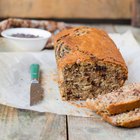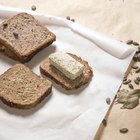
DAJ/amana images/Getty Images
A staple in French kitchen, French bread -- sometimes referred to as baguette -- combines flour, yeast, water and salt to make a crusty loaf. While the bread does impart a somewhat nutty, buttery flavor, one slice of French bread does not contribute a great deal of nutritional value to your meal plan.
Calories and Fat
A 2-ounce piece of French bread contains 164 calories. If enjoying it as a snack, this fits in well with the recommended calorie range for snacks, which is 100 to 200 calories -- enough to beat any hunger pangs and provide energy. When having a piece of French bread with a meal, however, carefully calculate the number of calories in your eating plan to avoid consuming too many calories. One portion of this bread also contains 1 gram of fat.
Vitamins and Minerals
A 2-ounce serving of French bread contains several vitamins and minerals, giving you more than 10 percent of your recommended intake of the B vitamin folate, thiamin, niacin and riboflavin. B vitamins aid in metabolism in your body and help produce red blood cells, preventing anemia. The USDA reports that the same serving of French bread delivers more than 10 percent of the recommended daily intake of several minerals, including sodium, manganese and iron, but the mineral with the highest concentration is selenium. Selenium helps protect your body from heart disease, thyroid disease, cancer and declining brain function, according to the National Institutes of Health Office of Dietary Supplements. A 2-ounce serving of French bread contains 15.2 micrograms, which is 27 percent of the recommended intake of 55 micrograms.
Carbohydrates and Protein
One serving of French bread serves up 32 grams of carbohydrates, a macronutrient used for energy. Women require 225 grams of carbs per day, while men should consume up to 325 grams. French bread provides 1.4 gram of fiber, a form of carbohydrates that stays solid in your body to provide bulk in your diet. You should consume 25 to 38 grams of fiber per day for optimal health. This serving of bread also contains 6.66 grams of protein.
Sodium Dangers
The sodium content in a piece of French bread may make it a poor choice if you suffer from hypertension. Each serving contains 291 milligrams of sodium, or 13 to 20 percent of the daily value for sodium. Including excess salt in your diet can raise your blood pressure, cause your body to retain water and increase your risk of a stroke or heart attack.
Alternatives to French Bread
French bread traditionally includes white flour in the recipe, but if you are making this bread at home, consider using whole grain flour to increase the nutritional value. This will, however, change the taste of the bread, giving it a nuttier flavor and a chewier texture. It will also increase the vitamin and mineral content considerably, as well as the fiber.
Related Articles

Can You Use Malt Vinegar in Place of ...

How to Make Toasted Bread Sticks With ...

How to Freeze Brioche
How to Keep Indian Fry Bread Fresh

How Many Calories Is Wheat Toast?

How Much Whole Grain Should You Eat a ...

Calories in Banana Bread With Chocolate ...

How to Make Tomato Bruschetta

The Calories in Panettone

How to Freeze a Loaf of Bread

Calories in the Costco Parmesan Cheese ...

How to Prepare French Toast in Advance

How to Soften Overly Hard Bread

Provolone Cheese Nutrition Information
Calories in a Cucumber and Avocado Roll

Nutritional Value of Dark Pumpernickel ...

How to Keep Sandwich Bread Fresh All ...

Calories in a Subway Cheese Pizza

Can You Substitute Yogurt for Milk in ...

Can Yeast Bread Dough Be Frozen Before ...
References
- USDA National Nutrient Database: French Bread
- Harvard School of Public Health: Fiber -- Start Roughing It!
- Archivos Latinoamericanos de Nutrición: Nutritional Improvement of French Type Bread
- U.S. Centers for Disease Control and Prevention: Americans Consume Too Much Salt
- Fitbit: Whole Grain Baking Flour Mix
- MedlinePlus.com: B Vitamins
- National Institutes of Health Office of Dietary Supplements: Selenium
Writer Bio
Nicki Wolf has been writing health and human interest articles since 1986. Her work has been published at various cooking and nutrition websites. Wolf has an extensive background in medical/nutrition writing and online content development in the nonprofit arena. She graduated with a Bachelor of Arts in English from Temple University.
Photo Credits
DAJ/amana images/Getty Images